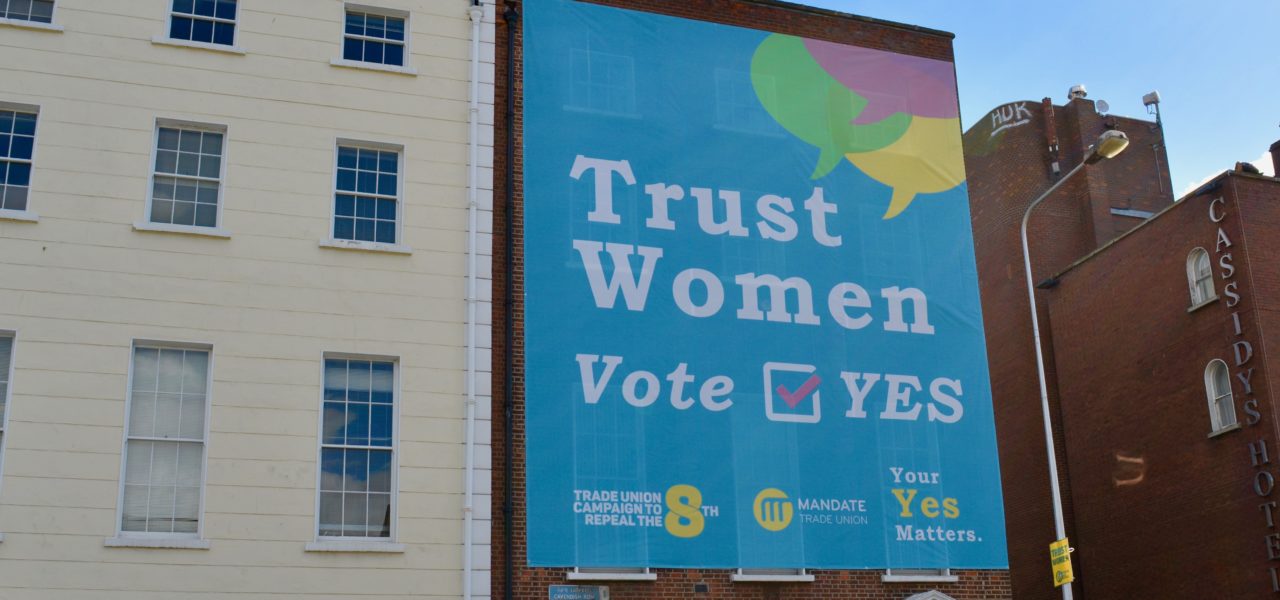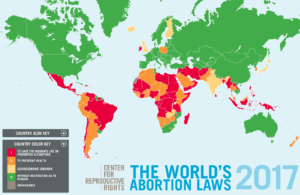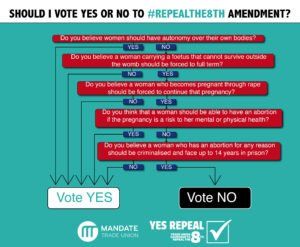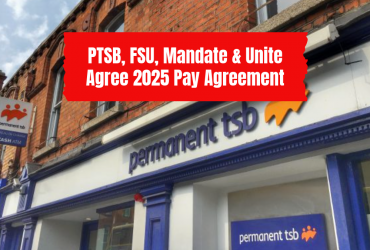
Repealing the 8th is about giving women access to healthcare in their own country
Wednesday 2 May 2018FRIDAY 25th May 2018 will be an historic day.
This is the date when we will be asked whether we want to vote Yes to repeal the 8th amendment, or vote No and maintain it in the Irish constitution. The implications of this vote are enormous. And there are no second chances.
This referendum promises to be one of the most divisive in recent decades, and with that, you can expect a lot of misdirection, untruths and lies.
The truth is, abortion already exists for Irish women. It’s just that they cannot avail of the badly needed care, support and healthcare they need in their own country when they make the difficult choice to terminate a pregnancy.
Former Supreme Court judge Catherine McGuinness recently said: “Saying there is no abortion in Ireland is a fairytale and is utter hypocrisy. It’s time to end the pretence.”
Every single day more than nine women leave Ireland for the UK in order to have an abortion, with figures showing that more than 170,000 have travelled there since 1980.
In 2016, for example, a total of 3,265 girls and women gave an Irish address when attending an abortion clinic in the UK. This is an underestimation because many don’t give their real addresses when availing of the service, while others choose to attend clinics in other parts of Europe such as Amsterdam.
For low-paid workers, those on social welfare or those from low income backgrounds, they simply don’t have the option to travel because they cannot afford to take the trip.
1,642 abortion pill packages were also sent to Ireland in the period 2010 to 2012 by a single provider. It is now thought more than three women per day are taking abortion pills without any medical supervision across the country.
The stigma and fear many of these women face is exacerbated by the knowledge that if they are caught taking these pills, they could face up to 14 years in prison.
So, women who have been impregnated through rape or incest, who are suffering with cancer or other medical complications, or who are carrying a foetus that cannot survive outside the womb, are all faced with an extremely difficult choice – gather money together to travel overseas to end their pregnancy, or else take an abortion pill and risk both their health and their freedom.
And every single day more than 13 women make that choice. So saying Ireland does not have abortion is a fallacy. Sadly, because of the ban on abortion, women from Ireland tend to access abortion later than those living in the UK or elsewhere.
However, recently Liverpool University Hospital, which attends to a lot of Irish women for cases of fatal foetal abnormality are now turning them away because they cannot deal with the sheer volume of Irish women in the hospital and must prioritise NHS patients. This means women are either being forced to go further afield than the UK or take babies that will not survive to full term.
Ireland is relatively unique when it comes to women’s reproductive choice. In Europe, only Malta does not allow abortions alongside Ireland. Whereas the UK, France, Germany, Spain, Belgium, the Netherlands, Sweden, Russia, Norway and almost every other developed country around the world – including the USA, Australia, China, Canada, Uruguay and South Africa –all allow women a choice.
Ireland, shamefully, remains in the same category as countries like Afghanistan, Nigeria, Congo, Iran, Colombia and Papua New Guinea when it comes to women’s bodily autonomy.
What do trade unionists think about the 8th amendment?
Mandate Trade Union along with a number of other trade unions commissioned research on this issue to establish what our members’ opinions were. The report Abortion as a Workplace Issue was published a number of months ago with significant findings:
When asked about the circumstances when abortion should be available:
- 77% said when a woman’s life is at risk;
- 66% said when the pregnancy is the result of a rape;
- 64% said when the pregnancy is the result of incest;
- 65% said in cases of serious malformation of the foetus;
- 62% said when a woman’s health is at risk; and
- 51% said when a woman asks for an abortion.
Only 9% said “none of these” options. Significantly, 87% of respondents said women should not be arrested and prosecuted for having an abortion. One of the important themes that came across in the study was the workplace implications of having an abortion. Almost half of all those surveyed said they had struggled to pay for the costs of the abortion. 23% said they needed time off after the abortion but could not afford to lose wages and 20% saying they needed sick leave, but could not take it, possibly due to the illegality of having an abortion.
Women should not be put through all this extra trauma when they make any choice about their own body.
What does the public think about the 8th amendment?
The Citizens’ Assembly, which was established by the Government with randomly selected members of the public, made a number of recommendations on this issue:
- 89% expressed support in the case of pregnancy as a result of rape.
- 89% supported in the case of the unborn child having a foetal abnormality that was likely to result in death before or shortly after birth.
- 78% supported there is a risk to the woman’s physical or mental health.
- 48% said there should be no restriction up to 12 weeks.
This 12-week proposal is now being supported by the Joint Oireachtas Committee and, in the event the 8th amendment is removed, will likely serve as the legislated form of abortion in Ireland. This is the norm around the rest of the developed world.
When you go to the polling station on Friday, May 25, 2018 to decide whether to repeal the 8th amendment or not, please remember that:
- A No vote and retaining the 8th amendment will prevent women who have been impregnated through rape from availing of an abortion.
- A No vote could result in women with cancer being prevented from accessing life-saving healthcare services.
- A No vote could have a damaging impact on life-saving maternity care because doctors cannot intervene to help a woman due to the possibility of a heartbeat in some circumstances.
- And a No vote will mean women will still be criminalised for accessing abortion in Ireland.
Whatever your opinion is about the circumstances when access to abortion should be available, the Irish Constitution is no place for the regulation of women’s bodies.
Voting Yes is the only way to ensure women have bodily autonomy and they can get the care they need in a crisis pregnancy.
Have confidence in yourself. Trust your mothers, daughters, sisters and all of the other women in your life to make the right decision about their own bodies. A Yes vote is not a vote for abortion, it’s a vote for choice.
Vote Yes and let’s bring Ireland into the 21st Century.
By David Gibney
Mandate communications officer
Click on the below image to view an informative chart produced in order to inform members about the upcoming referendum.







